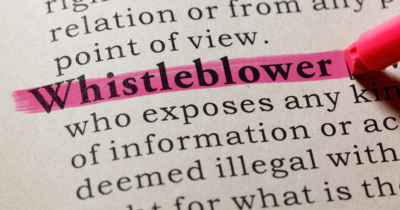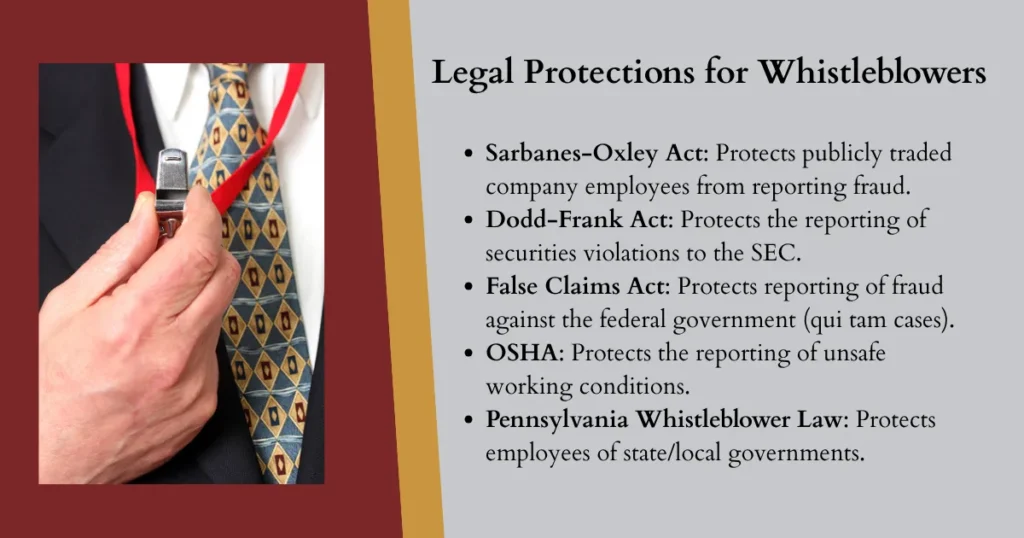Philadelphia Whistleblower Lawyers
Advocating for Workers’ Rights in the Delaware Valley
If you’ve witnessed illegal or unethical conduct in your workplace that you can no longer ignore, you may be considering blowing the whistle. Whether your employer is endangering workers, defrauding the government, or violating safety or financial regulations, the law provides protections when you speak up. However, reporting misconduct can put your job and reputation at risk. That’s why it’s critical to work with an experienced Philadelphia whistleblower lawyer who can protect your rights and guide you through the process.
What Is a Whistleblower?
 A whistleblower is someone who reports unlawful or unethical activities within an organization, either internally or to an external authority. This could involve financial fraud, workplace safety violations, or deceptive practices that endanger the public or defraud the government. Typically, whistleblowers are employees or insiders with first-hand knowledge of the wrongdoing.
A whistleblower is someone who reports unlawful or unethical activities within an organization, either internally or to an external authority. This could involve financial fraud, workplace safety violations, or deceptive practices that endanger the public or defraud the government. Typically, whistleblowers are employees or insiders with first-hand knowledge of the wrongdoing.
Whistleblowers may include frontline workers, office staff, or even high-level executives who have been asked to participate in illegal actions—or who discover misconduct while doing their job. Regardless of your position, if you have evidence of wrongdoing, you have the right to come forward.
Common Types of Whistleblower Cases
There are many types of workplace misconduct that may give rise to a whistleblower claim. Some of the most common include:
- Violations of workplace safety standards that put employees at risk.
- Financial misconduct, such as securities fraud or falsified accounting records.
- Fraud involving government contracts or programs, such as billing for services not provided.
- Marketing or distributing dangerous products despite knowing the risks.
- Actions that pose a danger to public health or safety.
In some situations, whistleblowers file claims under federal laws that allow them to recover a portion of the government’s recovery, such as under the False Claims Act through a qui tam action.
Legal Protections for Whistleblowers
Federal and state laws prohibit retaliation against whistleblowers. Depending on the nature of the misconduct you report, several legal protections may apply:
- Sarbanes-Oxley Act: Protects employees of publicly traded companies who report fraud, including prohibitions against termination, demotion, harassment, and discrimination.
- Dodd-Frank Act: Prohibits retaliation against employees who report securities violations to the SEC.
- False Claims Act: Protects individuals who report fraud against the federal government, particularly in qui tam cases.
- Occupational Safety and Health Act (OSHA): Prohibits retaliation for reporting unsafe work conditions.
- Pennsylvania Whistleblower Law: Protects employees of state or local governments and other publicly funded organizations from retaliation for reporting wrongdoing.

How Employers Retaliate Against Whistleblowers
Despite legal protections, employers may still try to retaliate against whistleblowers. Retaliation can take many forms, including:
- Wrongful termination
- Demotion or loss of benefits
- Workplace harassment or verbal abuse
- Exclusion from projects or meetings
- Negative performance reviews without basis
- Damage to professional reputation
- Threats or intimidation
Retaliation may be subtle or overt, but both are illegal. If you believe your employer has retaliated against you for speaking up, legal action may be warranted.
Taking Legal Action Against Whistleblower Retaliation
You don’t need to prove that your employer committed the underlying violation—only that you reported suspected misconduct and were retaliated against as a result. If successful, a whistleblower retaliation lawsuit may entitle you to compensation, including:
- Lost wages and back pay
- Compensation for emotional distress
- Loss of future earning potential
- Attorney’s fees and court costs
In especially severe cases, you may also be awarded punitive damages, which are intended to punish your employer and deter similar misconduct in the future.
Why You Need a Whistleblower Lawyer
Reporting misconduct at work is risky. Your employer may try to silence you, discredit your claims, or make your work life unbearable. A whistleblower attorney can protect your rights at every stage—from the moment you decide to come forward through any legal action that follows.
An experienced lawyer can:
- Advise you on how and when to report misconduct.
- Help you file with the appropriate state or federal agency.
- Represent you in a retaliation or qui tam lawsuit.
- Pursue financial compensation if you suffer retaliation or help recover government funds.
At The Gold Law Firm P.C., we stand by whistleblowers who do the right thing, often under difficult circumstances. We’ll fight aggressively to protect your rights and your future.
Contact the Philadelphia Whistleblower Lawyers at The Gold Law Firm P.C. for Help Dealing With Your Workplace Issues
If you come forward to report misconduct at work, reach out to the Philadelphia whistleblower lawyers at The Gold Law Firm P.C. We can advise you during every step of the process as you deal with your employer. To schedule a free consultation, contact us online or call us today at 215-569-1999. With offices located in Philadelphia and Pennsauken, New Jersey, we proudly serve clients in South Jersey and Southeastern Pennsylvania, including Wilkes-Barre, Scranton, Northeast Philadelphia, Bucks County, Chester County, Delaware County, Lehigh County, Montgomery County, and Cherry Hill.



































